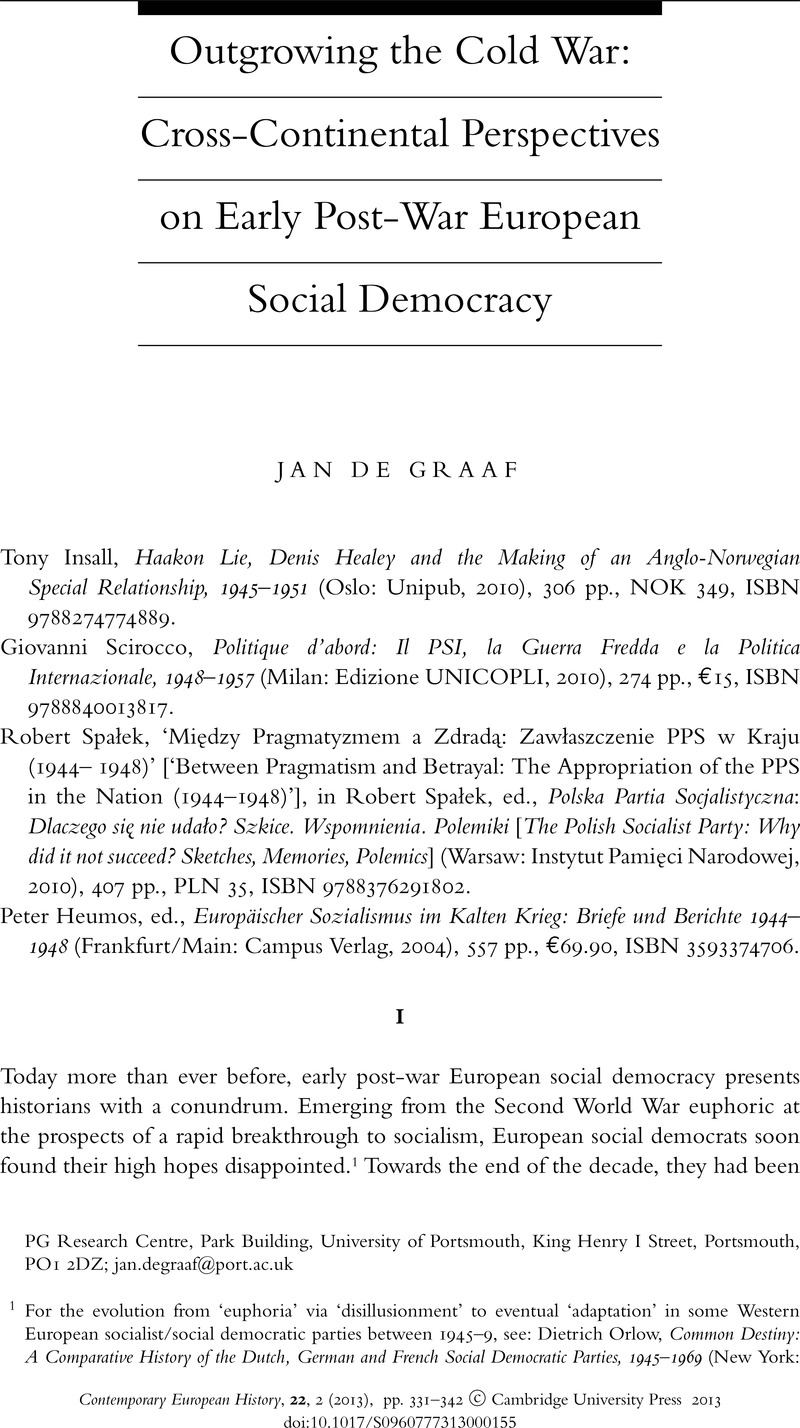Article contents
Outgrowing the Cold War: Cross-Continental Perspectives on Early Post-War European Social Democracy
Published online by Cambridge University Press: 04 April 2013
Abstract

- Type
- Review Article
- Information
- Copyright
- Copyright © Cambridge University Press 2013
References
1 For the evolution from ‘euphoria’ via ‘disillusionment’ to eventual ‘adaptation’ in some Western European socialist/social democratic parties between 1945–9, see: Orlow, Dietrich, Common Destiny: A Comparative History of the Dutch, German and French Social Democratic Parties, 1945–1969 (New York: Berghahn Books, 2000), 44–64Google Scholar. For the high hopes and ensuing disenchantment within the post-war European Left more generally, see: Eley, Geoff, Forging Democracy: The History of the Left in Europe, 1850–2000 (Oxford: Oxford University Press, 2002), 278–329Google Scholar.
2 The list of publications on American intervention in domestic political life in post-war Europe is endless. Suffice it here to mention just two accounts from the 1980s, which reiterate many cold war commonplaces on post-war Western European social democracy: Filippelli, Ronald, American Labor and Postwar Italy, 1943–1953: A Study in Cold War Politics (Stanford: Stanford University Press, 1988)Google Scholar; Grabbe, Hans-Jürgen, Unionsparteien, Sozialdemokratie und Vereinigte Staaten von Amerika 1945–1966 (Dusseldorf: Droste, 1983)Google Scholar.
3 See, for example: Révész, László, Die Liquidierung der Sozialdemokratie in Osteuropa (Berne: Verlag Schweizerisches Ost-Institut, 1971)Google Scholar.
4 On the British Labourites: Wilford, Hugh, The CIA, the British Left and the Cold War: Calling the Tune? (London: Frank Cass, 2003)Google Scholar. On the Dutch social democrats: Koedijk, Paul, ‘The Netherlands, the United States, and Anticommunism during the early Cold War’, in Krabbendam, Hans, van Minnen, Cornelis and Scott-Smith, Giles, eds, Four Centuries of Dutch-American Relations, 1609–2009 (Albany: SUNY Press, 2009), 597–607Google Scholar. On the German social democrats: Angster, Julia, Konsenskapitalismus und Sozialdemokratie: Die Westernisierung von SPD und DGB (Munich: Oldenbourg Verlag, 2003)CrossRefGoogle Scholar. In her work on the United States and the French Right, Deborah Kisatsky has even argued that the French socialists grew into the ‘favored clients’ of the State Department, see: ‘The United States, the French Right, and American Power in Europe, 1946–1958’, The Historian, 65, 3 (2003), 615–41.
5 Good examples of this are the articles published in: Creuzberger, Stefan and Görtemaker, Manfred, eds, Gleichschaltung unter Stalin: Die Entwicklung der Parteien im östlichen Europa 1944–1948 (Paderborn: F. Schöningh, 2002)Google Scholar.
6 Naimark, Norman, ‘Stalin and Europe in the Postwar Period, 1945–1953: Issues and Problems’, Journal of Modern European History, 2, 1 (2004), 36CrossRefGoogle Scholar.
7 Kenez, Peter, Hungary from the Nazis to the Soviets: The Establishment of the Communist Regime in Hungary, 1944–1948 (Cambridge: Cambridge University Press, 2006), 1–2Google Scholar.
8 Djokic, Dejan, ‘Introduction’, European History Quarterly, 36, 3 (2006), 348Google Scholar (emphasis in original).
9 McStea, Ulin Jodah, ‘Slowing Sovietization: The Labour Party, the Hungarian Social Democrats and the Elections of 1947’, European History Quarterly, 36, 3 (2006), 350CrossRefGoogle Scholar.
10 McStea, ‘Slowing Sovietization’, 367.
11 Djokic, Dejan, ‘Britain and Dissent in Tito's Yugoslavia: The Djilas Affair, ca. 1956’, European History Quarterly, 36, 3 (2006), 376CrossRefGoogle Scholar.
12 Berger, Stefan and LaPorte, Norman, ‘Ostpolitik before Ostpolitik: The British Labour Party and the German Democratic Republic (GDR), 1955–64’, European History Quarterly, 36, 3 (2006), 397CrossRefGoogle Scholar.
13 Berger and LaPorte, ‘Ostpolitik before Ostpolitik’, 397.
14 His East German interlocutors even noted that ‘he hated communism’. Berger and LaPorte, ‘Ostpolitik before Ostpolitik’, 410.
15 Berger and LaPorte, ‘Ostpolitik before Ostpolitik’, 414.
16 Favretto, Ilaria, ‘The Wilson Governments and the Italian Centre-Left Coalitions: Between “Socialist” Diplomacy and Realpolitik, 1964–70’, European History Quarterly, 36, 3 (2006), 423CrossRefGoogle Scholar.
17 Favretto, ‘The Wilson Governments’, 428–30.
18 Ibid., 426.
19 With the archives in communist Eastern Europe sealed off, Healey, Denis's edited volume The Curtain Falls: The Story of the Socialists in Eastern Europe (London: Lincolns-Prager, 1951)Google Scholar remained the only source on the post-war Eastern European social democratic parties for decades. Containing articles written by exiled Czech, Hungarian and Polish social democrats, its contributors seem more interested in settling the score with their former pro-communist adversaries than discussing their own role in the demise of Eastern European social democracy.
20 ‘European Socialism’. Labour Party Archives, International Department, Box 13, Labour History Archive and Study Centre, Manchester.
21 For a critical discussion of the ‘anomaly’ concept in relation to the post-war PSI see: Vodovar, Christine, ‘Il socialismo nella storiografia italiana e francese dell'ultimo decennio’, Ricerca di Storia Politica, 10, 2 (2007), 177–88Google Scholar.
- 1
- Cited by




